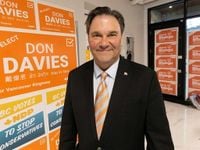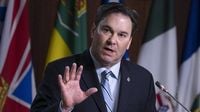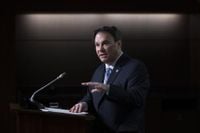OTTAWA — Interim NDP leader Don Davies announced on Friday, May 9, 2025, that his party is engaged in "very early" discussions with the government of Prime Minister Mark Carney regarding the possibility of being granted official party status in the House of Commons. This comes after the NDP was reduced to just seven seats in the recent general election, falling below the 12-seat threshold necessary for official recognition.
Davies expressed concern over the implications of this loss, stating that the outcome was one that "no one really foresaw." Without official party status, the NDP faces significant challenges, including a loss of financial resources provided by Parliament, fewer opportunities to ask questions during question periods, and no guaranteed spots on standing committees. "I think one of my primary objectives is to make sure that our caucus has the resources we need to discharge our functions in Parliament, but more importantly, to advocate effectively for the 1.2 million Canadians who voted for us," Davies said.
The Prime Minister’s Office has declined to comment on any discussions with the NDP. However, Davies noted that other parties at the provincial level have previously been granted official status despite not meeting the threshold. Kathleen Monk, a former NDP communications director, emphasized the importance of securing financial resources for the party's relevance. "Don Davies needs to ensure in the next eight months, maybe six months, that New Democrats don’t fall off the map, that they’re still a part of the parliamentary process and the media narrative," she remarked.
Since the election, many federal NDP employees have been laid off due to the party's loss of parliamentary funding, affecting senior leadership, communications staff, and researchers. In light of these changes, Davies stated that he and his caucus are exploring ways to use their remaining staff effectively and may seek resources outside the party. "There’s other ways that we can tap into public resources. We may have to engage civil society in ways that can help us in ways we haven’t before," he said, adding that it’s an opportunity to reimagine how they can open up a process and gain more input into their parliamentary caucus.
As he settles into his role as interim leader, Davies is also laying the groundwork for a leadership contest to select a permanent replacement for former leader Jagmeet Singh, who resigned after losing his seat in a historically poor showing for the NDP. Davies stepped up to serve in this interim capacity partly due to his status as the longest-serving MP in the NDP caucus, with 17 years of experience.
In addition to addressing party status, the NDP is beginning to review its election campaign and strategize for rebuilding. Davies acknowledged that while the work done in Parliament is crucial, many Canadians pay little attention to the daily operations within the Commons. Therefore, he emphasized the need for community outreach to rebuild grassroots support. "I think the challenge for us is also an opportunity, and that is, we’re going to have to get out of Parliament and go meet Canadians where they’re at, talk to them and start engaging in the dialogue that is not only so essential to our work, but I think is actually something that’s going to be a strength for the NDP moving forward," he explained.
Monk pointed out that the NDP must focus on reconnecting with Canadians and addressing a broader range of issues beyond health care. "I think that New Democrats somehow have lost their way over the last few years, where they are no longer the answer to Canadians’ economic problems, or haven’t been," she said. She highlighted the need for the NDP to expand its focus to include economics, international relations, and defense.
Davies outlined his priorities for Parliament, which include advocating for more "truly" affordable housing, expanding health care access, and creating "good jobs." He acknowledged the importance of reconnecting with working-class Canadians, especially after the NDP lost its foothold in industrial and manufacturing cities like Hamilton, London, and Windsor during the election.
"We have to go back and I think re-establish our working relationship with working Canadians, with organized labour, with gig workers, young people, people working in every sector of the economy," he stated. He also mentioned that understanding why the connection with working Canadians was lost will be part of the party’s post-election review process.
The NDP's loss of official party status is reminiscent of the challenges faced after the 1993 election, which former MP Svend Robinson described as "the Parliament from hell." Robinson, who served in the House from 1979 to 2004, recalled the difficulties of being recognized by the Speaker and the limited influence the caucus had on government policy during that period. "We would get a few questions every week. That was it," he said, highlighting the importance of having a strong presence in Parliament.
The NDP plans to strategically use its balance of power in the minority Parliament to push the government for real results, emphasizing priorities such as affordable housing, health care, and job creation. Despite the challenges, Davies remains optimistic about the NDP's potential to contribute meaningfully to the political landscape.
Robinson advised the NDP to focus on grassroots rebuilding, stating, "You obviously have to fight the good fight (in the House of Commons), but rebuilding the party is going to take place community by community, riding by riding, and strengthening the grassroots of the party, which sadly have been allowed to largely wither and die." This report by The Canadian Press was first published May 9, 2025.






